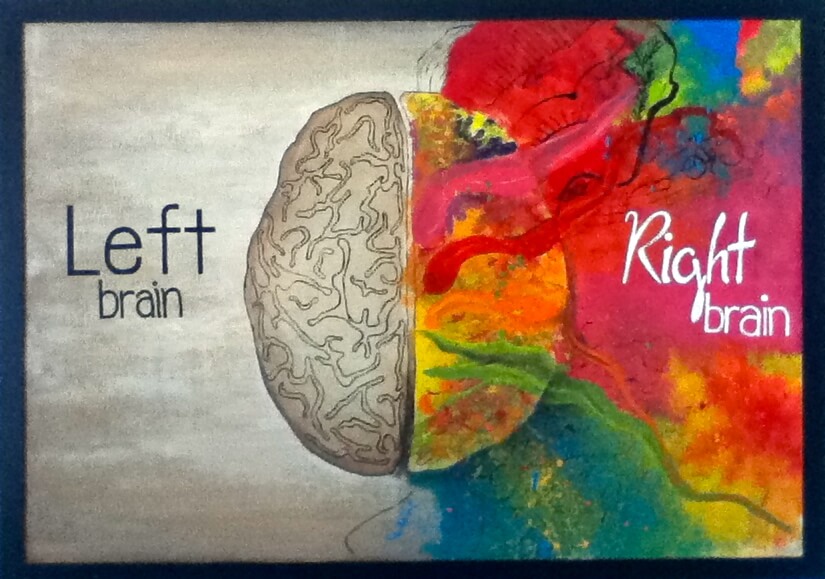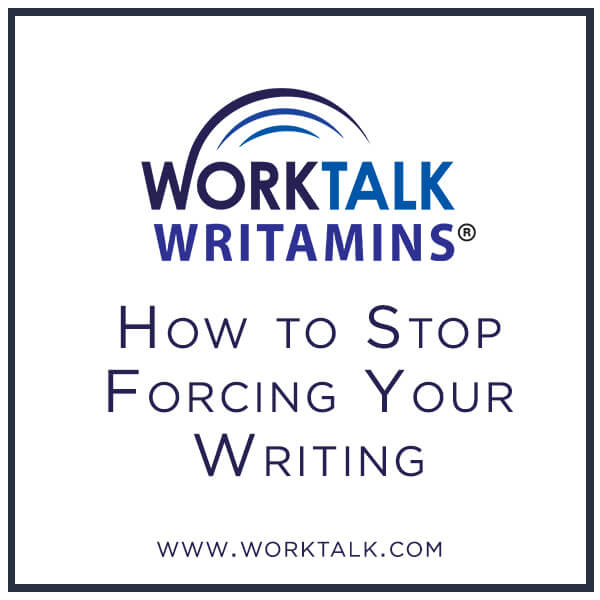
How to Stop Forcing Your Writing
Have you ever agonized over how to write something? Tried one word after another, not sure which was right? Stumbled through a sentence, painstakingly trying to piece together what you wanted to say?
Most of us have had this painful experience. Some of us experience it all the time. I like to think of people with this challenge as “forced writers” – they feel like they have to push every bit of writing out by force. It doesn’t flow naturally.
Why does this happen? In her book, Writing the Natural Way, Gabriele Rico explores this issue. She helps us understand this issue by framing it as a right-brain left-brain issue.
Right Brain, Left Brain: Different Roles
Research teaches us to think of our brain hemispheres as two brains that work in different ways. The left brain deals with parts of a whole. It tends to be more verbal, more linear, and more logical. The right brain deals with creating a whole out of parts. It is more rhythmic, more associative, and more emotional.
Right Brain Lets Writing Flow
When you write, a sense of wholeness is essential. True, you may not know everything that you mean to say from the get-go, but you need a big picture to direct you in your writing. This comes from the right brain. It is your vision, your sense of direction: It is what enables the writing to flow from you.
Sometimes, however, we block that right-brain process. We overthink the parts. We criticize every step we take. When we take the creative process of writing and turn it into a dry, critical process, our writing flow stops up. We lose our vision of where we want our writing to go. This creates the “forced writing” phenomenon.
What Happens When We Block the Flow?
When we lose the right brain’s influence, we lose the big picture. It’s a little like trying to piece together a puzzle without seeing what the image is supposed to look like. (I know some people might prefer that challenge!) However, with writing, you are creating the image. How will you put together the pieces when you don’t see where you are going?
How Do We Regain Flow?
A simple solution that we teach in the Worktalk writing training is to write straight through your first draft. Don’t stop to listen to that critical, left-brain voice telling you not to use that word or double-guessing your turn of phrase. Get the big picture in your mind and then let it flow. If you come across something your critical voice doesn’t like, put it in brackets and come back to it when you’re editing. Writing through your first draft will allow you to hold on to the big picture in your writing and not lose it as you agonize over the details.
If you find that you are still feeling forced, free yourself from the fear of criticism by telling yourself, “No one needs to see this but me. It doesn’t matter if it’s not great. I can delete it when I’m done.”
Right Brain and Left Brain Are a Team
Just as we need our right brain to help us flow through our first draft, we need our left brain to nitpick that draft when we edit. The idea is to keep each side of the brain doing what it does best.
If you are feeling that you writing is forced, ease up on the logic and criticism when writing your first draft and allow yourself to make mistakes. Don’t worry: Your left brain will be there with its pencil sharpened when it’s time to edit.
Please send me your stories about how you have gotten back in the flow. Send to upworktalk@gmail.com
Happy right-brain writing!

© 2018 Worktalk Communications Consulting
This Writamin was written by Emma Fialkoff, Worktalk trainer and curriculum designer.
~~~~~~~~~~~~~~~~~~~~~~~~~~~~~~~~~~~~~~~~~~~~~~~~~~~~~~~~~~~~~
Overcome the costs of poor communication today. Contact Elizabeth Danziger at lizd@worktalk.com or Emma Fialkoff at upworktalk@gmail.com to learn how you can achieve better business through better writing.
